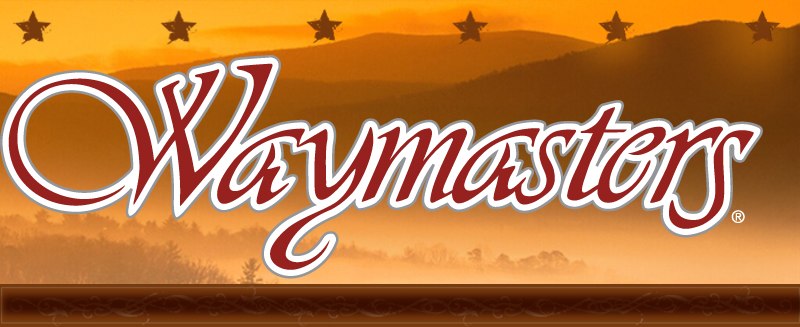They had spent the last four years with younger brother, Mike, singing in the gospel group, Heaven Bound, and
two years before that with the White Robe Quartet. But
now they were on their own. Singing was what they did
and now it was time for them to do it their way. So began the Waymasters.
The first few years of the new group saw it struggle with personnel and style. A friend from church, Grant Lanning, signed on immediately as the group’s lead singer. Tommy would be the bass singer, and Harold moved from baritone, which he had sung in the other groups, to tenor. They added two other members from church, Allen Davidson on baritone vocal and Jimmy West on piano. At that time the group was considered a quartet and used a piano as their only instrumentation.
Personnel in the baritone position would change often in these early years. Then, with Jimmy's departure in 1981,
the group found itself touring as a three piece. This
would mark the turning point for the
group's sound. With no piano, the group
was forced to revert to the style of music
they had learned to play in their living
rooms as boys. Instrumentally, Tommy
would play the bass, Harold, rhythm
guitar, and Mike Frizsell reunited with his
brothers to become the new baritone
singer and lead guitarist. As a result of
this change, the Waymaster sound, as we
now know it, was born.
The four toured extensively throughout the
early '80s. They would record two popular
records that remain fan favorites to this day.
They include their self-titled debut,
Waymasters, and their sophomore effort,
Old & New. Both records included often
unheard, mountain classics mixed with
original songs.
The year 1984 marked a big change for the
band. Not long after the release of Old &
New, Mike left the group. Soon afterward
Grant's younger brother, Clif Lanning, fresh
from the US Marines, was brought in as the new baritone singer. Without breaking stride, the group continued to tour. They also added a talented, young lead guitarist named
Lane Pressley. Lane's playing style and versatility
with different instruments began a theme
that would continue in the band. He
created depth by adding instruments like
the mandolin as a new part of the
Waymaster sound. At the end of the year,
on New Year’s Eve, Tommy's 12-year-old
son, Danny Frizsell, joined the band
relieving his dad as bass player. The
group was growing, but no one expected
what was to come.
In early 1985 the Waymasters recorded their third album,
I am His, He is Mine. Because they were still new to the band, Lane and Danny did not play on the project. Things were moving fast, and more change was coming. This was the year the version of the band most recognized as the “classic” Waymasters would be established.
This happened at the end of the year. Once again,
on New Year’s Eve, the band grew. Tommy's
oldest son, Darrell Frizsell, and two friends,
Tim Reynolds and "Chewie" McMahan, joined
the group—Darrell on banjo and harmonica,
Tim on guitar, and Chewie on guitar and
mandolin. This addition marked the beginning
of the group’s most productive and popular span
of the ’80s.
The group was more in demand than ever, and
in early 1986 they recorded their fourth record
entitled, Smoky Mountain Gospel. This time
Lane provided most of the lead instrumentation
for the album. The remainder of the year, the group toured heavily, continuing to spread the word of God through song and growing their fan base.
The spring of 1987 saw the release of the group’s fifth album, Led out of Bondage. It was recorded in a studio recently opened and owned by Lane. Though the project was popular with Waymasters’ fans, it would also mark their last record of the decade. The nine-piece band continued to tour heavily for over a year. During this
time, the group solidified the homegrown,
Smoky Mountain Gospel sound which is
so synonymous with their name today. It
was also during this time that they began
to enjoy regular play on radios across the
southeast with songs such as Led out of
Bondage, Joshua, Move Back Ole Satan,
and more. Then, in mid 1988, Lane came
to the band and sadly turned his lead
guitar duties over to a then still “green”
and young, Chewie. Lane had felt led
to expand his talents beyond the group, and plans
for marriage were also on the horizon forcing the
tough decision. A vital member of the band, his musical impact is still reflected in the group to this day.
The group now numbered eight. Four
singers and four band members. In fact, now in their
late teens, the four band members were writing songs
and singing as well. They had even dubbed themselves, “Canaan Band”—Danny singing lead, Tim tenor, Darrell baritone, and Chewie bass. They had progressed so far
in fact, that they often substituted for the other singers
when necessary.
The next two years kept the group very busy. Their popularity was at its peak and their full schedule kept them out of the studio and on the road. The 1980s ended with the Waymasters at the top of their game and widely considered one of the most spiritual and entertaining gospel artists of the south.




























